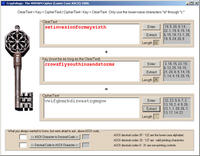-
NATO prepares for a new, futuristic war
NATO’s Operation Locked Shields, an international military exercise the military alliance conducted last month, was different from trasditional war games. There were no bullets, tanks, aircraft, ships, or camouflage face-paint. The troops involved in the exercise spent most of their time in air-conditioned rooms within a high security military base in Estonia. The exercise, a window into what a future war would look like, had one team of IT specialists detailed to attack nine other teams, located in different parts of Europe. The IT experts, working from their terminals in the Nato Co-operative Cyber Defense Center of Excellence, created viruses, worms, Trojan Horses, and other Internet attacks, aiming to hijack and extract data from the computers of their “enemies.”
-
-
#WeGotBinLaden: how Twitter broke its biggest story
A new study confirms the widely held belief that Keith Urbahn (@keithurbahn), an aide to former Secretary of Defense Donald Rumsfeld, was the first person to break the news regarding the killing of Osama bin Laden on Twitter; his tweet was sent at 10:24 p.m.
-
-
Facebook, antivirus providers in Internet security campaign
Facebook, Microsoft, McAfee, Symantec, Trend Micro, and Sophos have joined in a campaign to make it easier for Facebook users to stay safer and more secure online
-
-
Cyberattack disrupts Iran’s oil production system
The Iranian oil industrywas subject to cyber attack this past weekend,but the Iranian government saysit has contained and controlled the damage from the malware; this is the fourth known cyber attack on Iran’s civilian and military infrastructure
-
-
Better cybersecurity for the healthcare industry
Healthcare organizations face ever more threatening cyber attacks. In response, the Health Information Trust Alliance (HITRUST) has established the HITRUST Cybersecurity Incident Response and Coordination Center to provide support for the healthcare industry
-
-
Global CyberLympics Games agreement announced
Organizations announce 2-year agreement to conduct the CyberLympics Games, a series of global cyber games held on six continents and aiming to raise awareness of information security and unifying global cyber defense
-
-
Closing digital security gaps
Two European research centers, one German the other from Luxemburg, have recently agreed on a mutual course for the strategic development of new and integrative approaches to addressing key IT security concerns
-
-
Feds recruit companies to aid in cyberdefense
The U.S. national security community is intensifying its efforts to enlist the aid of the private security sector in bolstering the U.S. cyberdefenses
-
-
Companies hiring hackers to harden defenses

To burglar-proof your home, it is best hire a burglar as a consultant, as he is more likely to find the security vulnerabilities and demonstrate how they can be exploited; following this approach, companies large and small are now hiring hackers to test the companies’ security system vulnerabilities and find ways to harden these systems to withstand intrusion
-
-
WWII-like message encryption now available for e-mail security

A Singapore-based company offers an e-mail encryption system based on the Verman cipher, or one-time pad, which was invented in 1917 and used by spies in the Second World War; the Vernam cipher is unbreakable because it produces completely random cipher-text that secures data so that even the most powerful super computers can not break the encryption when it is used properly
-
-
Industry insiders: insufficient security controls for smart meters
False data injection attacks exploit the configuration of power grids by introducing arbitrary errors into state variables while bypassing existing techniques for bad measurement detection; experts say current generation of smart meters are not secure enough against false data injection attacks
-
-
HPDC to publish best grid computing cybersecurity papers
In the late 1990s, as science was pushing new limits in terms of levels of computation and data and in the collaboration between scientists across universities, countries, and the globe, grid computing emerged as the model to support such large scientific collaborations by providing their computational resources and the structure behind them
-
-
2012 National Collegiate Cyber Defense Competition kicks off 20 April

The National Collegiate Cyber Defense Competition (NCCDC) is returning to the University of Texas at San Antonio (UTSA) for the seventh consecutive year; the 3-day national championship will kick off 20 April
-
-
U.S. power and water utilities face daily cyberattacks
American water and energy companies deal with a constant barrage of cyberattacks on a daily basis; these incidents usually take the form of cyber espionage or denial-of-service attacks against the utilities’ industrial-control systems
-
-
Passwords contribute to online insecurity
One percent of passwords can be cracked within ten guesses; German and Korean speakers also had passwords which were more difficult to crack, while Indonesian-speaking users’ passwords were the least secure
-
More headlines
The long view
Researchers Develop AI Agent That Solves Cybersecurity Challenges Autonomously
New framework called EnIGMA demonstrates improved performance in automated vulnerability detection using interactive tools.
